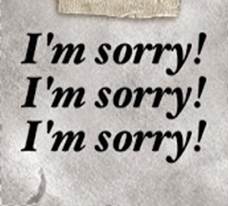“I’m sorry! I’m sorry! I’m sorry!”
Our hearts go out to the children who have the triple-sorry mantra as their “go-to” phrase when they think they have committed a social faux pas.  These kids feel like they have made an egregious error and feel terribly about what they have done. We want kids to acknowledge their mistakes and apologize for purposeful wrong doings. However, the kids who tend to triple-sorry usually use it as either a reaction to something that can usually be answered by just saying “okay,” or as a habitual phrase for avoiding working through a problem. For example, a small correction from a peer or an adult such as, “Those aren’t the rules of the game,” or “Running isn’t allowed indoors,” can be answered with “okay” and do not require an apology.
These kids feel like they have made an egregious error and feel terribly about what they have done. We want kids to acknowledge their mistakes and apologize for purposeful wrong doings. However, the kids who tend to triple-sorry usually use it as either a reaction to something that can usually be answered by just saying “okay,” or as a habitual phrase for avoiding working through a problem. For example, a small correction from a peer or an adult such as, “Those aren’t the rules of the game,” or “Running isn’t allowed indoors,” can be answered with “okay” and do not require an apology.
Imagine how a child must feel if he or she goes through life feeling the need to constantly say he or she is sorry for something. It is important to teach kids when a true apology is warranted (when something is done in a purposeful way) and when it is not necessary (an honest mistake). For example, a child who deliberately destroys another child’s block tower on the floor by kicking it needs to understand that an apology is expected for not working through the preceding problem in a way that worked better. A child who accidentally knocks over that same tower can say, “Oops, I didn’t see that there. I can help you fix it.” In this way, we can help children to be less hard on themselves.
Children also use the triple-sorry as a habitual way of avoiding working through a problem. In this scenario, we coach kids on showing us actions that can address the situation rather than providing an avoidance phrase in the hopes that the problem will disappear. Children can learn that everyone makes mistakes and the ways to acknowledge, make amends and apologize as needed.
